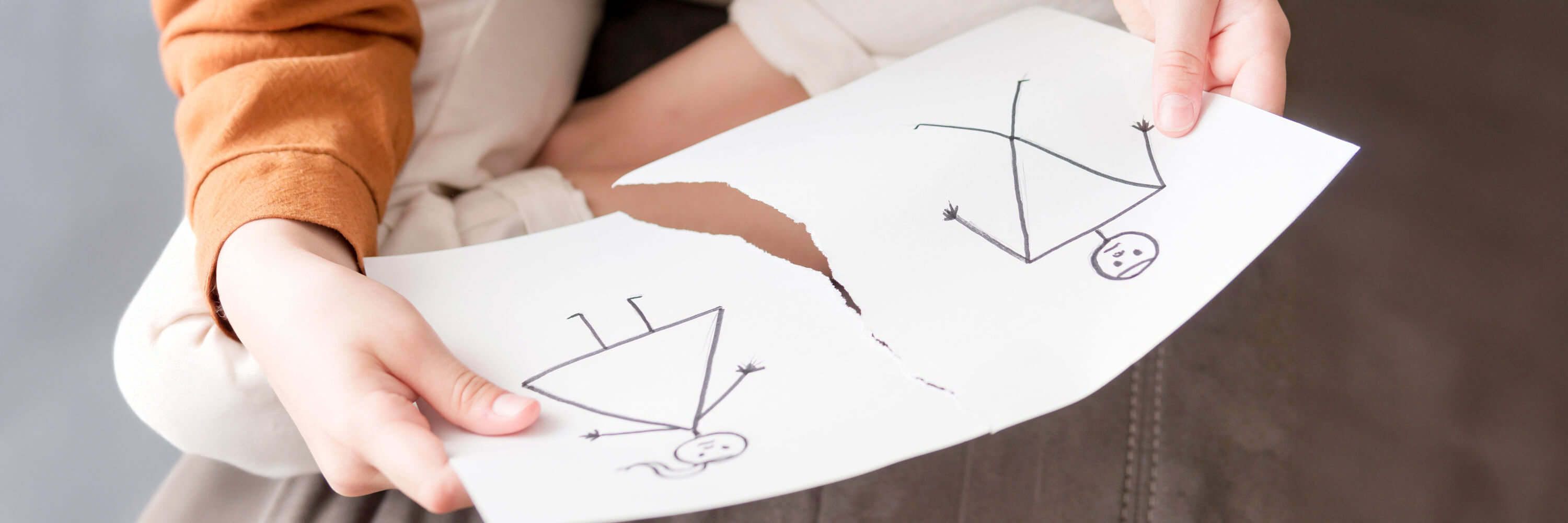When family relationships come under strain, a child can often become the focal point of disputes. When might the child end up in the custody of someone other than their parents? And in such cases, is the child’s opinion decisive? From our practical experience, finding the child’s best interests is not always straightforward. There can often be a fine line between the child’s wishes and their actual best interests. So, how can this delicate balance be best achieved?
Any decision regarding the custody of a minor child must primarily consider the child’s best interests.
Life can present situations that disrupt the balance, harmony, and peace among relatives, turning those who should be supportive into enemies. Often, the subject of disputes is property, but in practice, we frequently encounter cases where a child becomes the centre of conflict. We see grandparents suing their own children for the right to see their grandchildren, and even more contentious situations where relatives argue with parents over who will have custody of the child.
Generally, any decision regarding the custody of a minor child must primarily consider the child’s best interests. It is undoubtedly in the best interests of every child to be in the custody of their parents. The Charter of Fundamental Rights and Freedoms also stipulates that the care and upbringing of children is a right of the parents. Under the Charter, children also have the right to parental care and upbringing. Only a court may limit parental rights or separate minor children from their parents against their will, based on the law.
Under the Civil Code, specifically Section 953(1), third parties may only care for a child if the parents are unwilling (abandon the child), unable (e.g., due to illness or incapacity), or incompetent (e.g., due to drug addiction). This provision is certainly not intended to become a tool in disputes over the child within the broader family. Instead, the law aims to assist in situations where, for said reasons, parents are genuinely unable to take care of the child or should not do so due to their condition.
According to a Study on the Use and Functioning of the Institute of Granting Custody of a Child to Another Person (Custodianship) in Practice conducted by the Research Institute for Labour and Social Affairs in 2022, over 20,000 children were placed in various forms of substitute family care (foster care, temporary foster care, guardianship with personal care, and granting custody of the child to another person). Of these, 71% ended up in the custody of a relative or close person. The number of children placed in the custody of a third party has ranged between 4,000 and 5,000 in recent years. Specifically, at the end of 2021, there were 4,534 such children in the Czech Republic.
Does the child's opinion matter?
In 2023, the Constitutional Court issued a landmark decision in a dispute between a father and his former mother-in-law (the maternal grandmother) over the custody of a 14-year-old daughter following the mother’s death. When the parents divorced three years ago, they agreed on how to care for their daughter. The custody of the girl was granted to the mother, and the father continued to see her every other weekend. However, in 2021, the mother passed away, and despite the previous guardianship court ruling, the father automatically became the sole legal guardian and custodial parent.
In reality, the maternal grandmother immediately moved into the house where the girl had been living with her mother. She opposed the father’s move into the house with the girl, sparking a dispute. A court case followed, during which the girl expressed her wish to stay with her grandmother and continue seeing her father on weekends, as before. The Constitutional Court upheld the ruling granting custody of the daughter to the grandmother. In this specific case, the higher courts agreed that it was in the child’s best interest to honour her opinion.
However, it is always a question of whether the child’s opinion and their best interest are necessarily the same. Is it practically possible for the custody of a child to be taken from his/her parents and granted to his/her grandparent, uncle, aunt, or other relative just because he/she says that he/she prefers being with them over his/her own parent? Once again, under the Civil Code, a court may only place a child in the personal custody of another person if neither the parent nor guardian can personally care for the child. Leaving guardians aside, let’s examine what it means when neither parent can personally care for the child.
This condition clearly indicates that there must be some obstacle preventing the parent from providing childcare. This obstacle can be objective or subjective (the parent is unwilling or currently feels unable to provide personal care). But can the child’s expressed wish be considered such an obstacle? According to the Constitutional Court, this seems to have been the case here. Neither court identified any other obstacle, and the father repeatedly argued during the proceedings that he was both capable and willing to care for his daughter. His custody was even supported by the Children Social and Legal Protection Authority (OSPOD). However, the Constitutional Court (or rather the regional court, whose ruling the Constitutional Court found correct) still ruled to prefer the grandmother’s custody.
Relatives kept in check
The death of a parent is a very serious circumstance. However, to state that the child’s opinion alone is sufficient to abandon parental care effectively means resigning from the child’s duty to respect their parents, which is also enshrined in legal norms. Ad absurdum – what about the stance of a child, especially during adolescence, who might keep their parents in check with the argument, “If you don’t comply, I’ll go live with grandma”?
In each specific case, it is crucial not only to find out the child’s opinion but also to properly assess it. How deep is the child’s belief of their expectations of parental care? Why do they prefer one person over another? From practice, we know very serious cases where the relationship between the child and the parent has been so damaged that it would be difficult to force the child into contact and convince them that it is in their (theoretical) best interest to be raised by that parent. Typically, these are cases of domestic violence against children or domestic violence against the other parent, which the children witnessed.
Similarly, we also have cases where one parent apparently manipulates the child against their parental counterpart. In such cases, it is usually appropriate to allow the non-preferred or even rejected parent a chance to “convince” the child through personal effort or to “remind” the child of their presence, and to symbolically return the child to where they were when family relationships were still intact. We also know of cases where a child has tried to leverage their preference for one parent to gain the most “for themselves.” This might happen because one parent (or one of the custodial persons) is more lenient, more fun, allows the child to pursue hobbies that the other parent does not support as strongly, and so on. In such situations, it is crucial to be very cautious and carefully consider whether it is in the child’s best interest to adjust the balanced care and educational influence of both parents based on the child’s opinion, which is significantly influenced by their comfort.
Finding the ideal solution is always challenging, and as lawyers, we strive to ensure it is considered within the broader context of the family situation. In cases where the custody of a child by a third party is being decided, this should be even more clear-cut. If there is no (and proven) obstacle preventing a parent from providing personal care, it is not possible to consider placing the child in the custody of a third party. However, the said Constitutional Court ruling changed this perspective and shifted the interpretation. We have also experienced where this can lead in our practice.
Fight in the family
In 2016, young Dominik was placed in his mother’s custody. He saw his father once every two weeks on weekends due to the significant distance between the parents’ residences. In 2024, when Dominik was 11 years old, his mother died. When it was being decided who would take care of the boy, his uncle (the brother of the deceased mother) immediately filed a motion for a preliminary decision to care for the boy. The court granted his motion, placing Dominik in his uncle’s custody for three months. The basis for this decision included the uncle’s statements, a notarial deed in which the mother had expressed her wish before her death for her son to be placed in the uncle’s custody, and a psychologist’s report stating that Dominik did not want to be in the position of having to choose.
In the previous case, the Constitutional Court stated that “it is in the best interest of the minor to remain in the existing, familiar, and safe environment of her grandmother after the mother’s death.” However, in Dominik’s case, no one asked for his opinion, nor did anyone investigate whether the father’s environment was “safe” or “less safe.” The uncle unexpectedly came to take his nephew into his care at the mother’s funeral, where Dominik had arrived with his father. Only through the diligent and patient work of legal counsels was contact between Dominik and his father re-established after weeks of separation, which ultimately led to a change in the court’s view of the family situation. Despite the uncle’s new motion, the court did not extend the preliminary decision. The fact that the father had a real chance to have Dominik with him again was crucial in this case.
Unfortunately, from our practice, we know of cases where prolonged separation from a parent, combined with the persistent efforts of the other “side” (whether it is the other parent or another custodial person) to alienate the child from the parent or prevent them from spending time together, leads to an irreversible breakdown of the relationship with the child and permanent rejection. Even if a parent achieves a “legal victory” after years, no document can restore the child’s affection, or the years lost in their relationship. This is why it is crucial to address and resolve such situations as swiftly as possible within the bounds of the law.
The case of minor Sofie
As illustrated by the aforementioned cases, the child’s best interest does not always align with their wishes. It is also not feasible to place the responsibility for their own development on children, nor to ignore their significant objections or concerns. It is always essential to listen to the child’s opinion and try to understand it within the context of their family situation. This is exemplified by a third case.
Sofie was placed in the custody of her mother in 2019. She saw her father relatively infrequently, but they had a good relationship. The mother began to struggle with alcohol problems. This manifested primarily at home, and the daughter had to cope with it. In 2023, the family situation escalated when ten-year-old Sofie ran away from home to her father’s place. He contacted his former mother-in-law, with whom he had a good relationship, and they sought help from OSPOD. However, OSPOD did not effectively assist; they contacted the mother, and the daughter was returned to her care.
A few weeks later, the situation repeated, and the girl ran away again in the evening, crossing the city to reach her father. The mother noticed her daughter’s disappearance after some time and had the police search for her. They found her at her father’s place late at night. The father once again reached out to his former mother-in-law for help. Since he unfortunately did not have suitable housing for his daughter to stay with him, he, along with his mother-in-law and a lawyer, jointly filed a motion for a preliminary decision to place the daughter in the grandmother’s custody for three months. OSPOD eventually supported the motion, and the court issued the preliminary injunction.
In the subsequent proceedings, the mother denied having an alcohol problem and rejected any issues with her approach to caring for her daughter. However, the daughter described her mother as often aggressive and unpredictable under the influence of alcohol, hiding alcohol in her school bag, toy box, or closets. She also recounted being woken up at night to clean and having to undress and put her intoxicated mother to bed. Despite repeated promises to stop drinking, the mother always relapsed. Considering all the circumstances and the daughter’s opinion, the court granted the motion and placed the daughter in the grandmother’s custody. In this case, the daughter’s significant objections to her mother’s care were crucial.
Based on the three stories mentioned, it is clear that even a seemingly simple rule in the law regarding granting the custody of children to a third person can be applied in vastly different ways in practice. From our perspective, the crucial point is that the primary criterion should be the child's best interest, considering the specific child in their unique family situation.
From our experience, in family disputes, which are always full of emotions, we recommend focusing simply on what is truly best for the child at that moment. This means considering not only the child’s wishes but also the overall environment, stability, safety, and long-term development.
Although these family disputes are always extremely challenging, trying to resolve the conflict calmly and avoid accusations is crucial. Our role as lawyers is not only to find a legal solution but also to look at the whole matter with the necessary perspective and facilitate dialogue between the parties. Mediation or the involvement of an impartial expert can be utilized, and psychologists or social workers (OSPOD) can also be involved to offer an objective point of view, assess the situation, and help find a solution in accordance with the law.
The ideal situation is to avoid disputes altogether. If at all possible, work with a legal counsel who has the experience and objectivity to find an agreement within the family that will reflect the needs of the child and both parties in the conflict. An agreement that minimizes going to court is always the least stressful for the child.
Note: The names of the minors used in the article have been changed.








